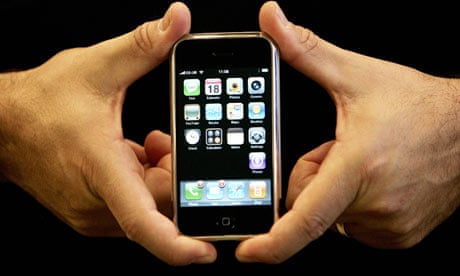Apple's iPhone is not the profit generating must-have gadget assumed by the mobile phone companies, according to new research, but is in fact turning into a worldwide loss-leader.
The research, from Denmark's Strand Consult, comes as Orange and T-Mobile are believed to be in talks to try to wrestle the Apple device from the exclusive grasp of O2 in the UK. The two companies – both of whom supply the phone in other European markets – are hoping to try to break into O2's deal in November, which will mark two years since the phone went on sale in the UK. Owned by Spain's Telefónica, O2 has always maintained that it has a "multi-year" exclusive deal with Apple but in most other countries, other than the US, the phone is available from more than one network.
The iPhone is seen by many in the industry as having given some operators an "edge" over the competition. In July, Vodafone's finance director, Andy Halford, admitted that the firm was keen to supply the iPhone across more of its empire. It currently sells the device in 11 countries but not in the key European markets of Germany, where it is stocked exclusively by T-Mobile, or the UK. "It's a good product and we would love to have it in the portfolio in more countries," he said.
But in its research report, The Moment of Truth – a Portrait of the iPhone, Strand Consult argues that iPhone hype hides the heavy subsidies that operators have to pay to Apple, coupled with the company's replacement cycle and the revenue share it demands in some markets. This means it is not the money-spinner many assume.
Certainly in terms of actual sales, the iPhone is a small percentage of the global market. In the three months to end June, Apple sold 5.2m iPhones compared with 268m handsets sold worldwide.
"We have not found one operator which has created shareholder value with iPhone," Strand argues. " A lot of competitors are actually doing better."
"That the iPhone is a handsome and trendy product is hard to question. However, how attractive is the iPhone from an operator's perspective? Apple and the media have created a one-sided image of the iPhone and the effect it has on an operator.
"As one chairman of a multinational operator stated: 'The iPhone effect is the effect that comes from moving our management's focus away from the 99% of our customers that generate the cash flow that pays our bills.'"
However, O2 dismissed the report, saying that it had benefited from the 'iPhone effect'. Andrew Harrison, chief executive of the Carphone Warehouse, and the exclusive independent stockist of the iPhone in the UK, said: "The impact of the iPhone on our industry has been huge, raising the technological bar and forcing other manufacturers and operators to reconsider their strategies."


